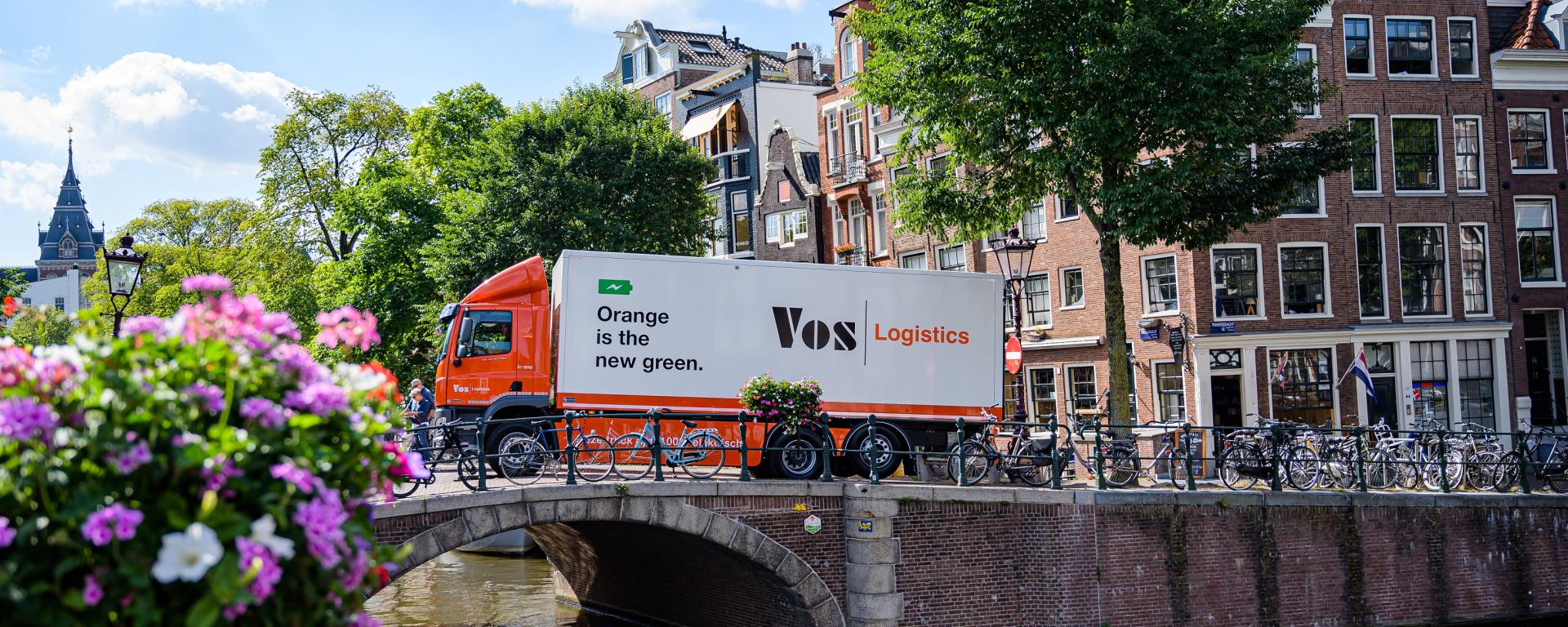
Going green
As the transportation industry evolves, Vos Logistics remains committed to staying at the forefront of innovation and sustainability. With our vision firmly focused on the future, the significance of electrifying our fleet becomes more and more relevant. While sustainability remains high on our agenda, we are proud to share that we are adding a total of six battery electric vehicles (BEVs) to our Benelux fleet. That way, we are taking yet another step to achieve our ambitious plans for the future and offer solutions for upcoming challenges and developments.
Why electrification matters
The urgency to embrace electrification stems from both, regulatory requirements, and our own ethical and competitive beliefs. In the Netherlands, 28 cities have already established zero-emission zones that will restrict access for old trucks starting from January 2025. As a logistics partner serving the Benelux region, we recognize the need to adapt to these changes. Furthermore, we believe that going electric is the right choice for the moment to contribute to a sustainable future and that it will ultimately benefit our business and customers. In addition to electrification, we recognize the importance of exploring alternative energy sources such as biofuel hydrogen. Therefore, we focus on more alternatives to reduce our emissions.
Electrifying our fleet brings a multitude of benefits. By transitioning to battery electric vehicles (BEVs) powered by green energy, we can significantly reduce carbon emissions. Each electric truck saves up to 62,000 kg of CO2 per year, equivalent to the positive impact of 3,100 trees growing for one year. In addition, BEVs produce less noise, creating a quieter and more pleasant environment for both our drivers and the communities we serve. The advantages of reduced emissions and improved air quality extend beyond our immediate operations, positively impacting the urban living environment.
Efficient deployment
We are already making significant progress in our electrification journey. This year, we have added six battery electric trucks to our fleet, which are now part of our Benelux Distribution and Home Delivery fleet. Also, we have taken steps in preparing our infrastructure by installing seven superchargers in Woerden and two in Oss.
Dennis Broeksteeg, Business Unit Manager in Woerden explains: “We are preparing for the future, but we can’t do it alone. To optimize the deployment of our electric vehicles and extend the range during daytime, we believe that cooperation with other logistic service providers is essential. Staying true to our motto The Power of a Shared Network, we are open to sharing our charging facilities and seek for opportunities to use charging facilities on other sites. This will help the sector as a whole to further decrease carbon emissions in transport and increase efficiencies.”
Milestones and future plans
The deployment of the electric vehicles marks an important milestone in our transition towards zero-emission transport. Just recently, we expanded the SolarOnTop system with another four trailers, adding up to a total of six trailers in total. By placing solar panels on top of our trailers, we can reach potential annual savings of 2,000 to 2,500 liters of diesel per truck. Looking ahead, our vision is to have a large portion of our fleet fully electric by late 2025, with the remainder following suit well before 2030. Furthermore, we will expand our distribution network with hubs in the coming three to five years. These hubs will address the limited range of trucks, the need for recharge time, and the capacity constraints of the power grid. To ensure sustainability, our hubs will be equipped with solar panels, wind energy solutions, and smart battery systems, enabling us to charge our trucks with our own produced energy. This sustainable distribution network allows us to reduce total kilometers, optimize truck utilization, and provide shorter lead times and improved service to our customers.
Overcoming challenges
While the shift towards electrification brings immense benefits, it also presents challenges. The rapidly evolving market and technological innovations require us to continually adapt our plans and evaluate the most suitable electric vehicle options. Additionally, network congestion and limited access to electricity pose logistical hurdles that we are actively addressing. Despite these challenges, we remain committed to finding effective solutions and driving progress.
Frank Verhoeven, CEO: “Vos Logistics is committed to driving the transition towards zero-emission transport. We acknowledge the challenges and are determined to overcome them through innovation and collaboration. Together with our customers, partners, and stakeholders, we can build a shared network that benefits our business, as well as the environment and the communities we serve.”
 Contact
Contact